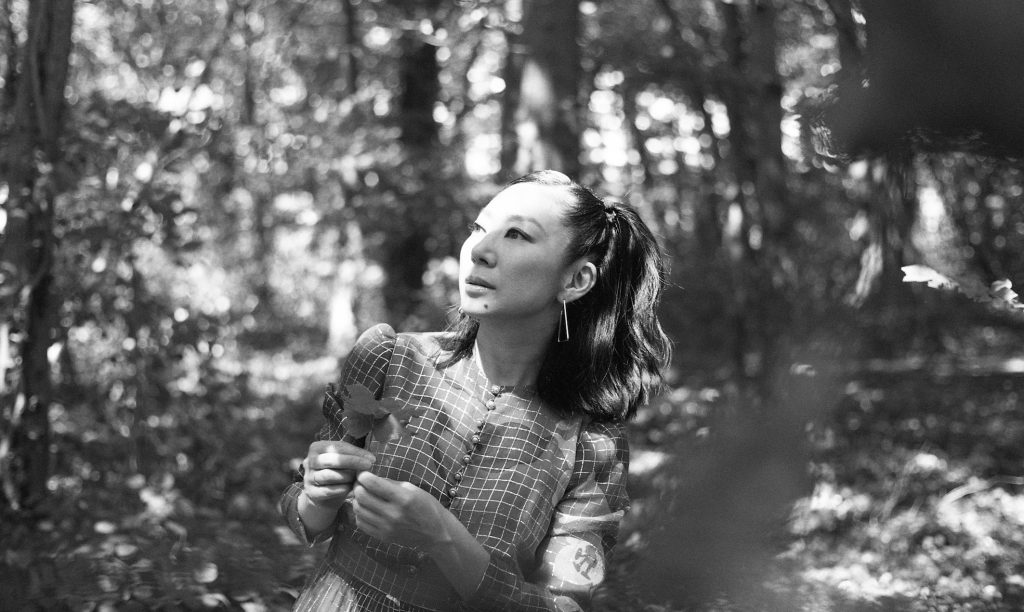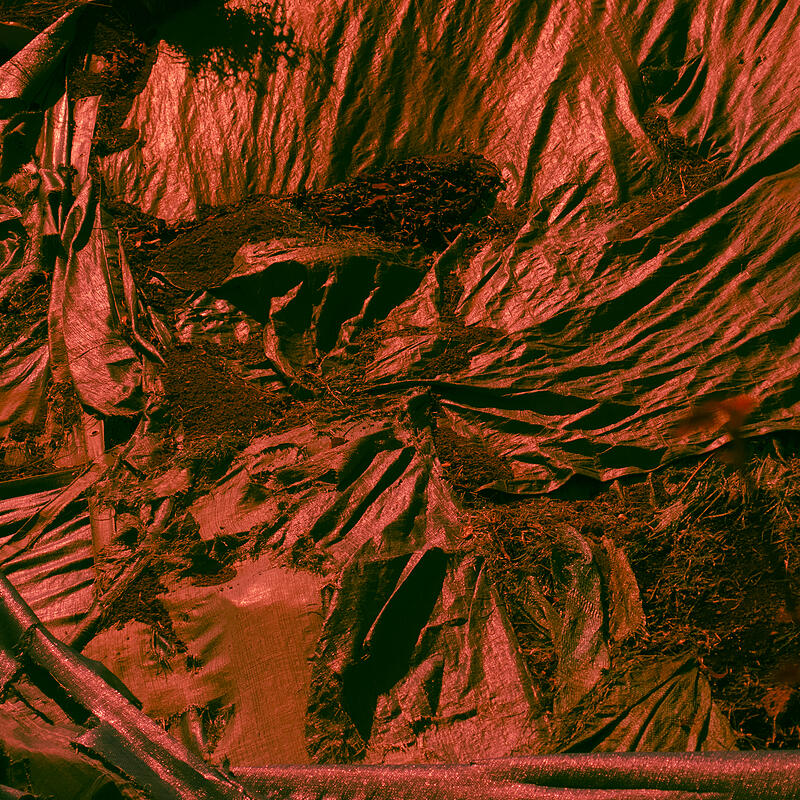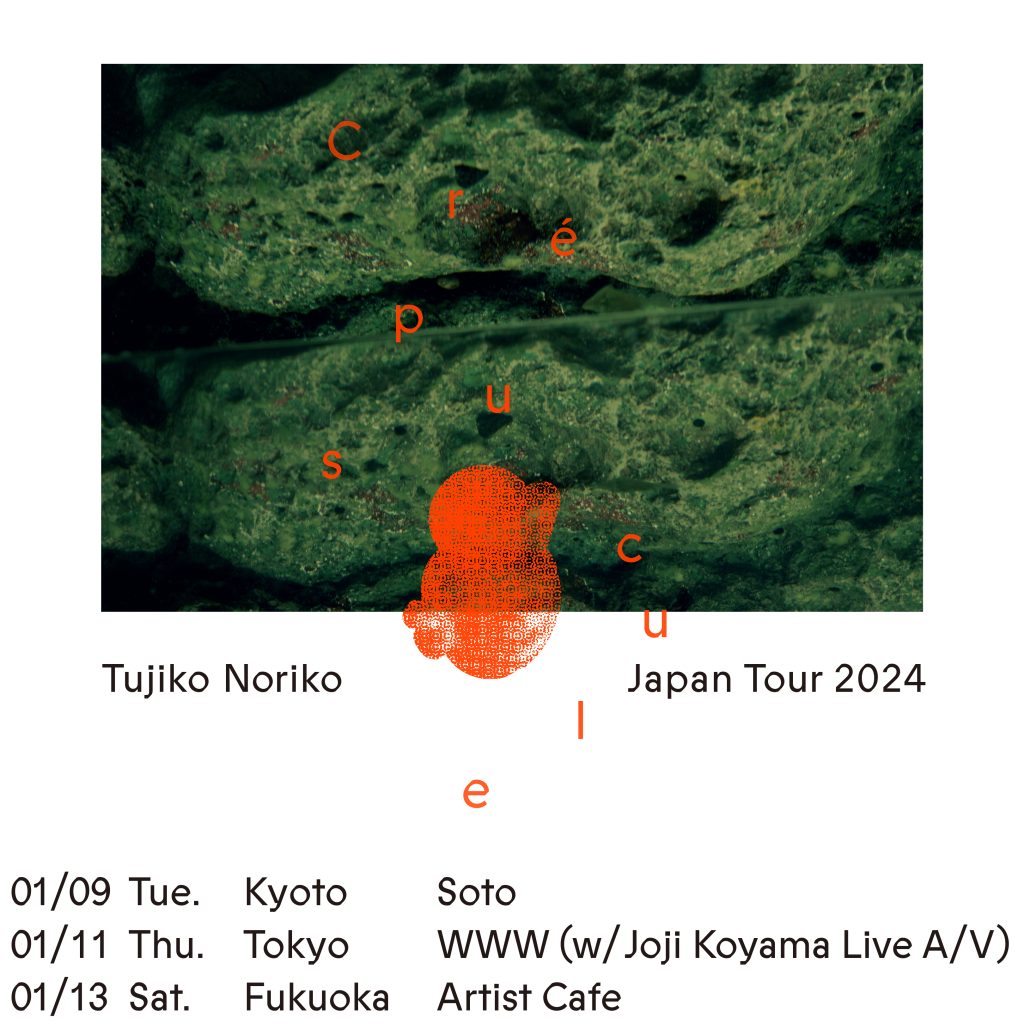
Tujiko Noriko is an artist from Osaka who’s based in France. Since her debut in 2000, Tujiko Noriko has released solo works from Mego (now known as Editions Mego), Tomlab, Asphodel, Room40, and so on. She released 28, a collaborative album with AOKI takamasa, on FatCat, and EAST FACING BALCONY in 2013 with Nobukazu Takemura. Her unique vocal style and musical universe have been positively received overseas, and she’s performed at prominent festivals like Sonar and Mutek. Tujiko Noriko began making films in 2005, and her filmography includes Sand and Mini Hawaii and SUN. She co-directed, starred in, and scored the 2019 film Kuro.
X (ex-Twitter): @tujiko_noriko
Official website: http://tujikonoriko.com
Tujiko Noriko is constantly opening new doors. Some might think this is an overstatement, but the more I listen to Crépuscule I & II, the first solo album she released in three years and nine months, the stronger my conviction becomes. It’s clear that this album is an extension of her previous instrumental work, Kuro, an illustration of the fluctuation of emotions. But with the addition of her vocals, saxophone, and euphonium, she paints a gentle and cinematic soundscape on Crépuscule I & II. The continuum of sounds drifting freely, which could be described as ethereal ambient music, contains an unprecedented degree of human warmth. 22 years have passed since the release of Toshi Shojo in 2001; what lies behind Tujiko Noriko continuing to make music? We were able to talk to her in France via ZOOM.
Looking back on Tujiko Noriko’s previous instrumental album and roots as a singer
–You released Crépuscule I & II on Editions Mego. Your last release on the label was My Ghost Comes Back. When did you start working on your latest album?
I started recording my vocals around the end of 2019 and finished it in a week or so. I then arranged the music in 2020, and it was basically complete by the beginning of 2021. I intended to mix the album immediately, but some time had passed. Before summer, I sent it to Peter (Rehberg, the founder of Editions Mego), but he passed away suddenly…
–I want to ask you something before discussing Crépuscule I & II. This is your first solo album since the eponymous soundtrack to the film Kuro (2019), which you co-directed with Joji Koyama-san, but you didn’t always make instrumental music. In hindsight, what do you think was good about the album?
It’s surprising that I had almost never made an instrumental piece of work. I was making a film called Kuro then, and my co-director, Joji Koyama-kun, said, “Why don’t you make the music for it too?” I thought it might be overkill for me to write, make, edit, and score the film, but he said it nicely, so I said, “I’ll do it.” When it came time to make the soundtrack, I wasn’t in the mood to sing because the film already had a lot of narration. There was no need for me to come up with a story for the music, so I was like, “I’m just going to follow the film’s story.” I was able to make it with abandon and freedom, and felt relieved because I didn’t have to sing.
–Are there any film scores or artists who make them you find interesting?
Mica Levi and I come from the same era, and what she does interests me.
–I had always believed one of the elements that made your music special was your singing, so your instrumental album came as a surprise. What sort of mindset has made you become the singer you are today?
I always have this story or image inside my mind, and I want to translate that into lyrics and sing it. I like small worldbuilding, like telling anecdotes, so I enjoy singing or adding music to depict it. I don’t have a message or anything. It’s not a coincidence that I also make films—I love things with stories.
–What initially drew you to singing?
When I was small, we had a cassette deck where you could listen and record sounds. It fascinated me, and my oldest sister and I would record our voices and songs. That was fun. My middle sister complimented me, saying that I was good at singing, which struck a chord with me. I started to feel like singing was fun because of that.
Crépuscule I & II, made from the idea of hope

–I’d like to ask you about Crépuscule I & II. What was the blueprint for it?
I made the soundtrack for a film called Surge (SURGE ORIGINAL SOUNDTRACK, released in 2022), and the film was so sad. I had to make music that would fit that, but as I did, I started having more and more fun. I would play sounds that were a bit more sparkly and cheerful, but I knew I couldn’t use them for the film. I had this image of something pretty and optimistic—the word, hope, popped up in my mind.
–How did you write the songs?
I arranged them a lot, but most of the songs initially started as improvisations. How it sounds to others is a different matter, but I like doing it. I’m shy, but I’m set free whenever I improvise. It’s like I begin feeling unrestrained as I explore things I find beautiful. I listen to the same song over and over again when I arrange my music so I can convey that beautiful moment to the listener. Music is a tool of communication, so I find myself subconsciously looking for a universal place to share with many people.
–There are some ambient moments in the album.
I was simultaneously working on a film score, so my approach was to make music that leaned into images. That’s what comes across as ambient-sounding. I like ambient music, but it’s not made with structure at the forefront.
—Crépuscule I & II is in two parts. Was this intentional?
It was supposed to be three. But when I got Joji Koyama-kun, my dear friend, to listen to it, he said, “Some parts are similar, and it’s a bit too long, no?” (laughs). I tend to add onto things, but Joji-kun helped me reel it in.
–Joji Koyama-san wrote the lyrics for “Roaming Over Land, Sea and Air.”What idea was this song based on?
I don’t remember when I made that song, but I used some of the melody from the first song off Shojo Toshi (“Endless End”). This song is like the sibling of “Opening Night” in part one.
Thoughts and feelings that haven’t changed since her debut, and lessons from Peter Rehberg
–I actually feel like Shojo Toshi and Crépuscule I & II are connected, even if it may not look like it.
You might be right. The equipment, studio, and whatnot differ, but I can’t help being drawn to certain sounds. Yes, I make electronic music, but I like organic sounds that blend into your skin rather than loud ones. Music is always somewhere, and I find and give form to it.
–It’s been over two decades since your debut. Do you feel as though you’ve changed as a musician?
It doesn’t feel like I’ve been doing it for a long time. I always feel like I’m a baby. It’s not like I’m stopping myself from growing up; it’s just that I can do so much more. I never run out of ideas and am ready to put out more songs. But I also want to make sure my personal life is okay, too.
–Last question. I heard you decided to release Crépuscule I & II on cassette because you previously sent Peter Rehberg a demo tape. What did you learn from his music as well as working with him? How are the lessons reflected in your life?
He wasn’t much of a talker. It’s not that he said anything to make me think this, but I felt a warmth from him, one that said I could be free and be myself. That very warmth and attitude encouraged different musicians as well. I also believe the listener could tell, too. He made me feel comfortable doing what I wanted, but that didn’t mean he spoiled me. Also, there’s a slight humor to his music, which made me realize that music with humor that doesn’t fit in a box is important. If it’s just pretty, it’d be boring. I mean, he did have a punk spirit, after all.
■Tujiko Noriko Japan Tour 2024

・Kyoto
Date: January 9th, 2024 (Tuesday)
Venue: Soto
Venue website: https://soto-kyoto.jp
・Tokyo
Date: January 11th, 2024 (Thursday)
Venue: WWW
Venue website: https://www-shibuya.jp/schedule/017371.php
*The Tokyo show will have live visuals by Berlin-based filmmaker Joji Koyama
・Fukuoka
Date: January 13th, 2024 (Saturday)
Venue: Artist Cafe
Venue website: https://artistcafe.jp
